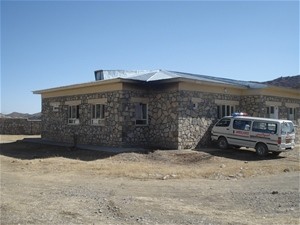
Gurbaz Comprehensive Health Center in Khost Province.
USAID/TECHSERVE
Every 30 minutes, a woman in Afghanistan dies from causes related to pregnancy and childbirth
8 NOVEMBER 2011 | KHOST, AFGHANISTAN
USAID is working with the Ministry of Public Health to combat maternal mortality and support sustained improvements in maternal, newborn, and child health outcomes by enhancing the role of health workers and midwives in rural communities.
Afghanistan's Gurbaz District is located in the southern part of Khost Province on the border with Pakistan. It is surrounded by mountains and has only a few roads, most of which are in poor shape. Few children go to school, especially girls. Maternal mortality rate is high because women generally know little about maternal and child health and the services that midwives and skilled community health workers, like Madina, can provide to them.
As a member of the Gurbaz Comprehensive Health Center, Madina participated in a USAID-funded training program for community health workers, where she learned to use analysis techniques to identify how best to achieve a measurable result.
One day, a woman named Jamila arrived at the health center after a complicated delivery at home. She was bleeding severely. While still at home, her family had worried as her condition deteriorated rapidly. Fortunately, her neighbor Marjana had recently met with a female community health worker and learned about the services at the Gurbaz Comprehensive Health Center. Marjana convinced Jamila's husband to take her there.
Immediately upon Jamila’s arrival, Madina saw her and realized she was already in a state of hemorrhagic shock and at death's door. The team of skilled health workers quickly stepped in and used manual vacuum aspiration to remove parts of the placenta that had remained in her uterus. The bleeding stopped and Jamila recovered, to the great joy of everyone. The family realized that if they had not brought Jamila to the health center, she would have died. They agreed to tell the families in their valley about the good services at the Gurbaz Comprehensive Health Center and remind them to go there quickly in case of an emergency. This incident has greatly strengthened the relationship between the health center and the community.
Improving the health of women requires addressing the gender inequities and barriers that keep them from accessing health services. USAID has been working with Afghanistan's health leaders to help combat maternal mortality and support sustained improvements in maternal and newborn and child health outcomes.







Comment
Make a general inquiry or suggest an improvement.